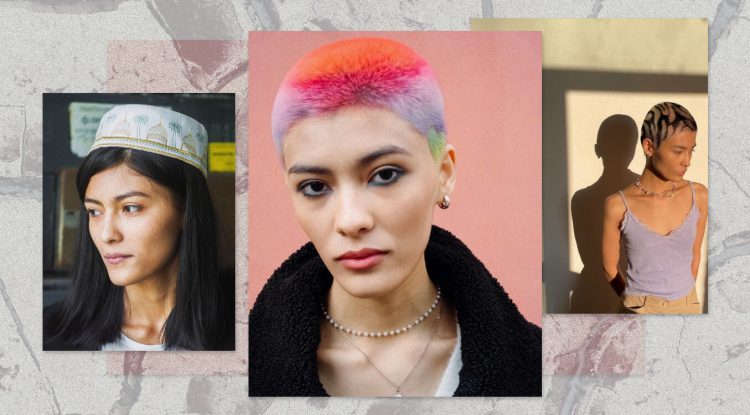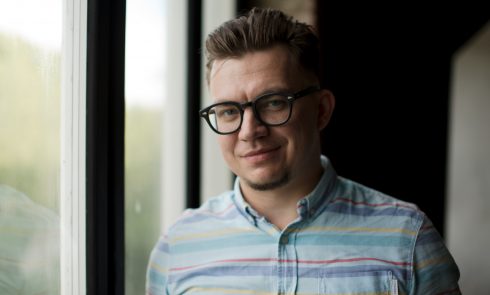Milana Nazir studies at the Faculty of Economics at the Moscow State University and teaches Maths in an online school. She is 20 years old, and she has lived in Russia for 15 years. Since her early childhood, Nazir has faced various forms of discrimination on the part of Russians. In April, she decided to do an Instagram post to share this issue with her friends, but it spread widely and is still reposted on social media. We asked Milana to share her experience of xenophobia and bullying in Russia, as well as the traumas this experience led to.
This spring, I shared a link to a Holod publication on how ethnic minorities live in Russia on my Instagram. A friend addressed me after that, saying that “xenophobia doesn't exist in Russia. The only people disrespected here are from the North Caucasus who allow themselves too much”. For a long time I tried hard to change his mind, gently and without imposing my opinion, but in the end, we got nowhere. It really upset me deeply that even my friends didn't understand the scale of the issue. Then I decided to write a post about my own experience. I wanted to share it with a limited circle of my subscribers, but it went viral very quickly.
Our family has always been frowned upon
I am Uzbek — and partially Kyrgyz. I was born in Kyrgyzstan, and I lived there until I was five. Then my mom took me and my siblings to Russia: In Kyrgyzstan we had lived in a village, with my father, who would constantly beat my mom up. One day he came home drunk while she and my sister were praying. He became pissed off about something, so he came up to them from behind and showered them with a bucket of of ice-cold water. Mom had always wanted to achieve something more than just a life in a village with my father. Besides, the level of education and life in Kyrgyzstan is lower than in Russia.
During the first and the second grades, I never really felt I was treated differently from the others. But when I entered the third grade and we moved to Kazan, it was hard for me to communicate with my classmates. For example, the girls would say that they wouldn't hug me because I was dirty and smelled bad. Kids would yell "Allah Akbar" at me, and those were Tatar guys, mind you. I knew that their families were Muslim, so I couldn't understand why they were doing that to me.
One day we were standing in a line at the canteen. A girl came up to me and, without asking anything, started rubbing me. I thought she decided to hold my hand, so I asked her what she was doing: she said she was checking to see if I was dirty or not. After that I started feeling likeI was actually dirty, like I wasn’t bathing properly. Then I started showering three or four times a day: I felt like I needed to wash the dirt off. One time I found Belizna ("whiteness", a sodium hypochlorite-based bleach similar to Clorox) in the bathroom and wanted to bleach myself with it. But, thank God, my mother came home at that moment, and told me off very badly.
I remember that our family has always been frowned upon when we were, say, on a bus. My mother told me later, when I grew up, that people would almost directly tell her they were afraid she might steal something from them. That said, my mother was a very educated woman. The only thing she could do was to get off the bus or sit somewhere further away not to feel them staring. She never confronted them directly: she understood that she would always stay a total stranger in Russia.
After all of this, while I was still at elementary school, I decided to directly ask my classmates why they wouldn’t talk to me. At that time I hadn’t yet understood that it was my ethnicity that kept others from communicating with me. My classmates told me that they didn’t talk to me because I just didn't look right, that my skin was darker and they felt like I didn't shower. After that I crawled into my shell and wouldn’t make any friends for a long time.
At that point my mother gave me a very strange piece of advice. She said that I needed to study well so that the guys would copy from me, so this would encourage them to be friends with me. But she never said anything about the fact that my skin color and appearance shouldn't have discouraged them from becoming friends with me in the first place.
If you joke about yourself, people won't bully you
After my mom saw my intent to bleach myself, my mother apparently realized that this was a very serious matter, and she started discussing Uzbek culture with me a lot. Back then, I despised everything Uzbek, I thought it was something bad, given that I wasn't accepted. My mother tried her best to explain that it was necessary to accept my ethnic identity, that there was nothing wrong with me being different. After those conversations with my mom I became more confident. We even started speaking Uzbek when outside sometimes, in a low volume.
In seventh grade I made my first friends. I think it was around that age that I learned to respond to the rude jokes. If you joke about yourself, people won't bully you, so humor became my defense mechanism.
However, I kept facing xenophobia. For example, in Kazan my Russian teacher would lower my grades: she bluntly told me that she “couldn't give a non-Russian girl an A when the entire class of Russians got B's”. When I passed the final test after the ninth grade with the highest score, she didn't believe me and asked: "Did you get the minimum at least?"
In eighth grade, I tried to understand why I hated myself so much. I had very low self-esteem concerning everything, be it my appearance or my personality. Eventually, I realized that it was my ethnic identity that annoyed me the most. I tried to find the answer why I could not accept myself.
I started reading some studies on the differences between people of different ethnicities. For example, whether such differences could affect the intellect. Obviously they cannot, but I needed to be sure of that. I came across articles about how difficult life is for the ethnic minorities in Russia, and I began to feel that I was not alone. That was very important to me. I also hadn't accepted the fact I have excessive body hair, but then I realized that it wasn’t anything to be treated or eliminated, it was just something you could live with. It was a relief to know that there was someone out there also dealing with similar issues. From that moment on, I never gave people a chance to make fun of me again.
In 11th grade, when I cut my hair very short, my art teacher told me, "Milana, it must be very hot for you here. You're from the mountains, the temperature is different there". And at the lecture devoted to Islam, she looked at me throughout the entire lesson and constantly asked me if everything was written accurately and correctly. By the end of the lesson she had spent a long time begging me to say a prayer in Arabic. I don't speak it, but my family taught me some Arabic prayers. I decided that nothing bad would happen if I recited one, but when I did, the teacher said: "Muslims are trying to recruit everyone to their religion," and that I was a prime example. Thankfully, most of my classmates came up to me after class and said that the teacher’s behavior was disgusting.
If a teacher has a Russian name, there are no additional questions
During my first year at university (I am a student of the Faculty of Economics at the Moscow State University) at one point I had to submit documents for the dormitory room. There are lots of students from China at the MSU, and, to prevent them from waiting in lines, they made separate offices for them to submit the documents. When I came up to the office I needed, the security guard said, "Students from China go the other way." I replied that I wasn't a from China and I needed a different office. Then he said that he wouldn't let me in until he sees a Russian passport.
Last year one of the professors at the university wouldn't remember my name, I think he pretended he couldn’t do that on purpose, and kept calling me Madina. I corrected him each time, but it didn't help. Such things happen all the time.
But in general, things have become better since I went to the university: I have very good friends and a boyfriend — all of them are Russians — who support me. They respect my experience and show appreciation of my culture. Joining a model agency at the end of the 10th grade also helped: at the photoshoots I stopped feeling there was anything wrong with my appearance.
Now I work as a math teacher in an online school. Before starting the lessons, there is a free trial one, and the parents can see me and my name. Sometimes they treated me very suspiciously, asking where I was from, where I was studying, and how long I had been in Russia. It seems to me that if a teacher has a Russian name, there are no additional questions. I try to react very delicately, I explain that my education is good and I am not a bad teacher, but in case there are any doubts, they can choose another one.
Russians are now beginning to understand what xenophobia is
I want to believe I have fully accepted my ethnic identity. I can’t be 100% sure because hostility to other peoples seems to be inbred in Russian culture, and I was brought up in this culture. Whether I want it or not, there’s still this inner xenophobia I’ve been trying to eliminate.
In those 15 years, I have been unable to feel at home either in Russia orin Uzbekistan. I have recently been on a plane to Moscow from Tashkent. At some point, I realized that I was uncomfortable with the fact that most of the passengers were Uzbeks. During the flight I was trying to figure out why, and I realized that if you grow up in Russia, ethnic minorities evoke fear and some kind of disdain in you. Even if you read the news, when a crime is committed by a Russian, his nationality is not mentioned, but when it’s someone of a different ethnicity, it is always mentioned.
Of course, all these experiences from my childhood have influenced me negatively. I might see a comment with some kind of a xenophobic connotation — not even on my page, but on somebody else's — and immediately apply it to myself, because I'm used to it. These triggers send me back to my childhood. All of this has resulted in me having very low self-esteem: I feel insecure about everything I do. As if I needed to prove that I am a human being not just because I am, but prove it with my intellect, education, or something else.
In the recent months, there has been more talk about Russophobia. I don't think it exists, but Russians are very sensitive to this phenomenon. When such discussions begin, I feel a strong urge to compare it with what I’ve been through and say that what they face is nothing compared to what national minorities face in Russia. Obviously, we should not compare experiences, and we should not devalue them, but it is one thing to be discriminated against in the land where you live, and another thing is to hear it from people from some other faraway country, and not be directly affected by those words. I think Russian people are now, little by little, beginning to understand what xenophobia is. I hope it will help them become more empathic.
In the fight against xenophobia, the representation of people of different appearances in movies and in the media plays an enormous role. It is very important to explain to children that people are different. If a child understands that it's okay to be different, I doubt that they will make xenophobic statements or use ethnic slurs when they grow up.


